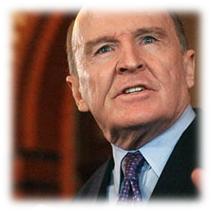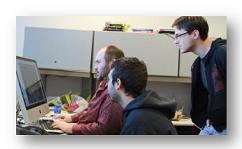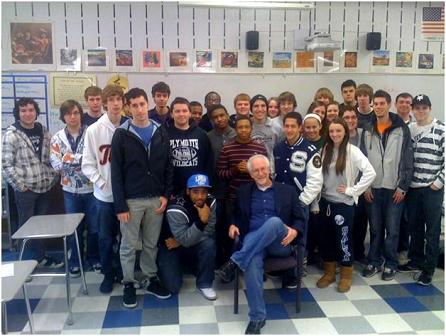What is reverse mentoring? A recent article in the Wall Street Journal defines it as “pairing upper management with younger employees in an effort to help educate corporate leaders.”
That’s what former CEO Jack Welch did at General Electric. He charged 500 of his senior executives with reaching out to employees well below them on the corporate flow chart (that is, younger people) in order to better understand and use the Internet and related technology.
 Reverse mentoring not only serves its intended purpose of educating mature workers, but it also facilitates their young up-and-comers getting more used to the ebb and flow of the business culture. And according to Andrew Graff, CEO of ad agency Allen & Gerritsen, it debunks the myth that “If you’re senior, you have a lot to teach, and if you’re junior, you have a lot to learn.”
Reverse mentoring not only serves its intended purpose of educating mature workers, but it also facilitates their young up-and-comers getting more used to the ebb and flow of the business culture. And according to Andrew Graff, CEO of ad agency Allen & Gerritsen, it debunks the myth that “If you’re senior, you have a lot to teach, and if you’re junior, you have a lot to learn.”
We’ve been espousing the value of reverse mentoring for many years in this blog. And campaigns like Edison’s “30 Under 30” celebrate the contributions that younger people are making in radio.
The problem is that many of radio’s top executives could greatly benefit from a reverse mentoring program where younger people in broadcast companies could share their viewpoints, talents, and everyday use of digital tools and gadgetry with the bosses in the corner offices.
For the last three years, I’ve had the honor of speaking to a “Fundamentals of Radio Broadcasting” class at Plymouth Salem High School here in the Metro Detroit area. The school has its own FM station – WSDP – and Station Manager Bill Keith and English teacher Lauren Cummings tag-team to teach the class.
It became obvious to me the first year that I visited the school that the students had a different perspective than their counterparts back in the ‘70s, ‘80s, or ‘90s. That’s because their generation is at the forefront of social media, mobile, and other emerging technology. I believe the initial goal of someone like me speaking to a class like this was for me to teach them about “the real world.” Today, the tables have turned.
So last week when I walked into the class, I was armed with an iPad, an Amazon Kindle Fire, and some topics that I wanted to talk about, but the most interesting part of the session was hearing from them. Do they own smartphones (mostly yes), do they want a tablet for Christmas (yes and no), and why don’t I use Skype to communicate with clients instead of hopping on airplanes 40+ weeks a year? Good question.
And of course, the hardest question: What does a consultant do anyway? Another good question.
 There’s a lot to be learned by listening – especially to young people who are in the forefront of technology. And the need for media employees of the future to be better educated, well-rounded, and to learn skills that go well beyond good mic technique and scheduling music.
There’s a lot to be learned by listening – especially to young people who are in the forefront of technology. And the need for media employees of the future to be better educated, well-rounded, and to learn skills that go well beyond good mic technique and scheduling music.
Every radio company in America should consider a reverse mentoring program. For a legacy industry, in particular, a youthful perspective may be the most valuable intellectual asset of all.
Who knows what could happen? Broadcasters would benefit from seeing the media world through a youthful lens. It might stimulate the creation of formats, programming, and content that appeal to young people. And it just might attract them to an industry that is in dire need of an injection of youthful intelligence and energy.
Bill, Lauren: Please invite me back next year.
- A 2020 Lesson?It Could All Be Gone In A Flash - April 24, 2025
- How AI Can Give Radio Personalities More…PERSONALITY - April 23, 2025
- Can Radio Afford To Miss The Short Videos Boat? - April 22, 2025





As a young broadcaster I’ve really been pushing this more with action than in word lately …It’s important for upper management to make room and encourage the next generation of broadcaster. Right now , especially radio it’s not friendly to those young people I’m talking about people like myself 25 and under, who have a severe passion for Radio. Yet have more than a hard time looking to express it. Due to mentors drying up because those who would be willing are worried about their own life, and the catch 22 to even find a basic entry level job due to the surplus of talent.
I’ve been lucky and blessed enough to not have the same struggles as some of my counter parts, finishing out my 2nd year hosting a morning show and selling, as well as my year and half programming the station. What are the results? In 2011 we are up almost 20%…Reverse mentoring needs to happen now, because it will allow more young people to get excited and enter broadcasting. And if you are surprised by my story. Honestly, I’m not even half as good as most the talent my age. It’s time to listen. Great post!
Keep at it, Paul. And today’s managers would be wise to listen to twentysomethings because it’s an effective way to learn more about how it’s being done in 2011. Thanks for reading our blog and providing perspective.
I’ve tried to mentor and teach the young up & comers for years now. From broadcast schools,to speaking at colleges, etc. Point taken it’s time for me to go back to school! Hey do they still use backpacks? Great article, Thanks!
They still use backpacks (and I’m seeing more managers in the workplace use them, too). Thanks for commenting, David.